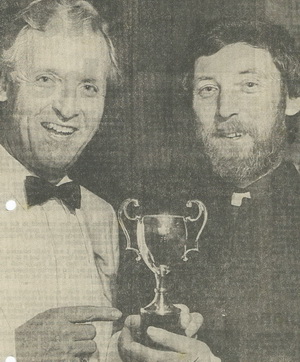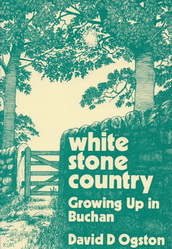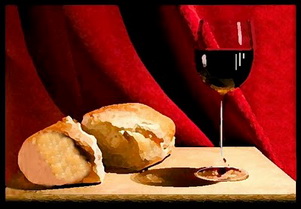
David was appointed Minister of Balerno Parish Church in 1973, and first attended ‘Let it Blaw’ in 1974. Having left Balerno for Perth in 1980, he was the unanimous choice to return and propose the’ Immortal Memory’ at the 1996 Supper which commemorated the 200th anniversary of Burns’ death ………
–
“ David “
born 25th March 1945 in Ellon
Died 22nd September 2008 in Perth, aged 63
—
Chaplain
1974, 1975, 1976, 1977, 1978, 1979, 1980
—
Proposer of the Toast “The Immortal Memory of Robert Burns” 1977, 1996
Proposer of the Toast “The Lasses” 1976
Reply to the Toast “The Lasses” 1980, 1983
Proposer of the Toast “Chairman & Croupiers” 1982, 1983
—
David was Minister of Balerno Parish Church from 1973 until 1980. During that period, and occasionally thereafter, he was a great supporter of ‘Let it Blaw.’ David was born in Buchan and, like the poet George Bruce whom he admired, Buchan was in his blood all his life. “The crop grew on the hill. The paths were trod. The land was peopled and tilled.” He was educated at Inverurie Academy and the University of Aberdeen, where he studied for degrees in arts and divinity. He was then spotted as one of the most promising ministers of his generation and invited to become assistant at St Giles Cathedral, where Dr Harry Whitley was coming towards the end of his long and often controversial ministry. The two; the respected, urbane Edinburgh preacher and the young, Doric-loving assistant developed a strong rapport. When Whitley retired from St Giles, there was a long vacancy during which David, helped by the other assistant Howard Haslett, sustained the daily work of the Cathedral. It was a time during which Ogston honed his gifts as a preacher and pastor and began to accept how gifted in ministry he might be.
Balerno Parish was David’s first charge. He is fondly remembered in the Village for his work on both a pastoral and personal level. As the parish history recounts: “He was a very modest man, with real talents as a communicator of the Gospel both in his parish and in the media. He combined an ability to relate to all kinds and conditions of people and was well matched to the needs of Balerno in the Seventies.”
David first came to ‘Let it Blaw’ in 1974 and, appropriately for the Parish Minister, was appointed Club Chaplain. Needless to say he gave the Selkirk Grace every year but also proposed several Toasts including the Immortal Memory in 1977, not to forget a few replies to Toasts also. He returned to ‘Let it Blaw’ for the four years immediately after his departure for Perth and, at the Club AGM in 1995, when those present were thinking of the best way to commemorate the 200th anniversary of the Bard’s death, a proposal that David be invited back to propose the Immortal Memory received unanimous backing. He duly obliged the following January. On that occasion, having rolled a cigarette from a box of tobacco and papers he had in his pocket, and poured himself another dram, David clarified with the Club President that he should speak for about 20 minutes prior to launching in to his oration without any notes. He was hugely knowledgeable, amusing, entertaining, everything he said was relevant, to the point and, just under half an hour into the Toast, he turned to the President and asked how he was doing for time, and whether any more was required. The President shrugged and said he was doing fine, so he gave another three or four minutes before raising his glass. In his lengthy speech, he held everyone’s interest throughout and not a sound was heard while he spoke. I remember it so well as it was my first year as Club President ! I don’t expect to hear such a great Toast to the Immortal Memory of Robert Burns again. That night David Ogston set a standard that the rest of us will forever strive to reach.
David’s speaking talents didn’t stop at Burns and preaching. The ‘Wits Dinner’ has now been held since the early 1980s to raise money for St Columba’s Hospice in Edinburgh. One of the first winners of the Wits Trophy was none other than David Ogston. The photograph below shows David receiving his award from TV personality Nicholas Parsons at the Dinner at the Prestonfield House in Edinburgh.
In 1980, he moved to the historic church of St John’s in Perth, whose architecture and tradition allowed David to develop his talent for liturgy, particularly in Scots. He devised services for weddings, christenings and communion in old Scots. He produced prayers of literary distinction and theological insight. His literary output expanded. The first volume of his autobiography, ‘White Stone Country’, subtitled ‘Growing Up In Buchan’ was published in 1986 and was described as “lively recollections of his early years in Aberdeen farmland couched in sturdy and expressive Scots prose and full of rich humour.” The second volume, ‘Dry-Stone Days’, published in 1988 was, like the first, written in the Doric of Aberdeenshire, recalling his childhood in the 1950s. Both books were illustrated by Let it Blaw’s own past President, Ken McDonald.
The third volume, ‘Grey Stone Zion’, completed his trilogy with recollections of his divinity student days at Aberdeen University in the 1960s. It was completed in the summer of 2008 shortly before he died and subsequently published by his widow, Meg, in 2010. Of this volume, Robbie Shepherd, broadcaster and journalist, wrote, “Time moves on and awa fae the Buchan of his upbringing we find here a student in the 1960s. With the humour of the North-Easter, the great command of the Doric and the skeely writing, this is a book I canna lay down.”
His years at Perth were distinguished by his ability to take on several local projects as well as administer a central city kirk. He played a prominent part in the life of the city; particularly the annual service known as the “Kirking of the Council and Dedication of the Common Good” before which the provost and councillors come to the church in procession with the representatives of local voluntary organisations. David Ogston was a popular broadcaster. He was often heard on BBC Radio Scotland and delighted in using the Doric whenever possible. He even wrote a special marriage service in Old Scots, concluding the ceremony with: “May they aye win farrer ben till een anither’s herts.”
Many might remember an STV late night programme called “Late Call” (last broadcast in 2006) in which a member of the clergy gave a few thoughts last thing at night. David made several appearances on Late Call and, in 1983, the text of one such appearance was inspired by a visit to ‘Let it Blaw’ :
‘Farewell my horse, my bonnie pair,
I’ll yoke an louse wie yon nae mair;
Farewell my plough, wie you this han
Will turn ower nae mair fresh lan.’
—
I never thought I’d hear that sung – it’s from “The Dying Ploughboy”, by the Rev. R.H. Calder, and it’s maybe 50 or 60 years ago since the song had any life to it. But I did hear it, one January evening a year or so ago. It was the Balerno Burns Club Annual Supper: a room full of men, the doctor, the dominie, the electrician, the minister, the lorry-driver side by side. All through the evening, the company are called upon to sing or to recite. And it was the lorry-driver (Jack McCaig Snr.) who stood up and sang “The Dying Ploughboy” without music, from memory. I was delighted because I thought the song had gone underground, but that man had learned it from farm-servants, remembered it, and made it live again for his audience.
I know for a fact that many people don’t go to the kirk any more, and God seems to be losing ground in our society – but it doesn’t depress me too much. Because the Lord’s song is buried deep inside many of us…… and it’s only waiting for its own true moment to be liberated and let out. We learned it, some of us, from our parents and our grandparents …. a long time ago…. and it went deep, and it’s not by any means forgotten …. maybe just neglected. We learned it, some of us, from Sunday School teachers, from Church, from Youth Leaders …. and it sank in, and it’s not disappeared, maybe just overlooked. We learn it, some of us, all the time – from brave, quiet people who show us how to cope with chaos …. and it’s all because they have a song buried inside them, and they let it sound out amongst all the clatter and panic of their trouble. The Lord’s song is not about farewells, but about glad tomorrows.
David introduced many innovations to St John’s. The inclusion of a donkey in a procession down the nave of the kirk for a televised service was typical of his desire to break conventional barriers, and for the Kirk’s 750th anniversary, David commissioned a poem from George MacKay Brown. Announcing his retirement, David said to his parishioners: “I leave with the utmost pride that St John’s have allowed me to be their friend, companion, pastor, fellow-straggler, their mixed up commentator and their witness to the struggle, their flawed and sometimes faithful herald of good things.” Such generous remarks were typical of a much loved and admired Man.
David retired in 2007, was diagnosed with cancer a few months later, and sadly died the following year. He was once quoted as saying that “Let it Blaw set the standard against which all other Burns Suppers would be judged“; Coming from him, perhaps, one of the best compliments ever paid to our Club.
David wasn’t a member of ‘Let it Blaw’ for very long, but few others who entered our lives for such a relatively short time could ever hope to leave such a huge impression. The words of past President of our Club, Ken McDonald, perhaps go some way to describing the memories of all who met David in his time at Let it Blaw; “Despite being fully aware that I was a non-believer, David and I were good friends and we spent many an enjoyable evening, either in Mrs Brow’s or by the fireside in his home or mine, with glass in hand. He never questioned my lack of belief or even raised the subject. We found we shared a joy of books and language, although his knowledge far exceeded mine, and always there was much laughter because we also shared the same sense of humour. These happy hours will remain in my memory for ever.“
The final word has to come from “The Meenister” himself :
“Here is whatlike it will be wi the Kingdom o Heiven”
(Matthew 25. 1 – Lorimer)
A SERMON FOR THE LORD’S SUPPER
David Ogston
In the twantie-fifth o Mattha the Wird is souple this day: a waddin, a bride-groom
hinnered tull the midnicht oor, five lassies that negleck their duty: ile for their crusies,
sae that the door is steikit faan the feast begins
.
We first tak tent o the bride-groom’s sorrow. Sorrow that his feast is blaudit bi the loss o
five, the five that shuid hae been the bringers o licht. Daes the bride-groom tak onie
pleisure in thir empty seats?
.
Sae think on this, my friens. Daes the Maister like His Kirk tae hirple on five vessels
less, or fifty less, Sunday bi Sunday? He needs your licht, fooiver smaa it seems.
Think on the lassies, that sair rowed up in themsels they forgot tae honour the day.
They ran for cover ahint ilkither. Kirsty said, “The lave wull hae ile for sure!” Jinty said,
“I winna be noticed gin it’s me that fails!” Bell wis ower thrang wi her bonnie hair tae
check if her ile wis siccar. An sae wis Kate, trig in her braws. An Florie wis that ahin
hersel she wis late for the grand occasion. Faa’s on yer mind faan ye come tae the
Feast o love – You or the Lord, the gracious host at the table?
.
We are nae ootlins here at the Boord. We ar socht an bidden, the door is nivver steikit.
Nae lustre we lay claim tull wins us seats aside him at the Supper, bit the lowe o his
beatin hairt o love, the love that gaurs Him cry us ben tae share the broken breid and
the reid wine o sacrifice.

